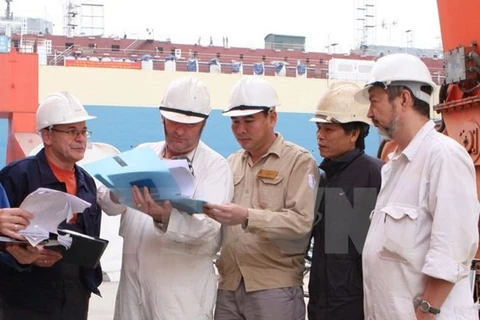Hanoi (VNA) – VietnamWorks, a member of Navigous Group - the leading provider of recruitment services in Vietnam, has released a report on “Expatriates: Expectations and Challenges when working in Vietnam”.
 VietnamWorks has released a report on “Expatriates: Expectations and Challenges when working in Vietnam”. (Photo: VietnamPlus)
VietnamWorks has released a report on “Expatriates: Expectations and Challenges when working in Vietnam”. (Photo: VietnamPlus) The report aims to help employers understand more about challenges facing foreigners, and propose businesses measures to help them better integrate into the host society.
50 percent of foreign candidates experience cultural shock
Thanks to its dynamic economic development, favourable geographical conditions, stable political system, and many new free trade agreements, Vietnam is now an ideal destination for foreign direct investment (FDI).
This is also accompanied by new challenges in the form of emerging fields, and Vietnamese human resources fail to match employers’ requirements in terms of both quantity and quality. Therefore, foreigners can fulfill requirements of these firms.
VietnamWorks predicts that the demand for foreign candidates will increase by 20 percent a year.
Given this, the biggest challenge for businesses is how expatriates can quickly adapt to Vietnam’s environment and culture.
The survey reveals that more than half of the respondents experienced culture shock due to differences in cultural and social value system.
Differences in language and social viewpoints lead to cultural shock
According to the survey, the factors leading to cultural shock were all related to the differences in the social value systems. The top three causes of the cultural shock as voted by candidates were language barrier (29 percent); conflict between perception and reality in terms of environment, local culture, relations (27 percent); and lack of understanding (18 percent).
When asked about their reasons for moving to Vietnam to work, 50 percent said it was because of their interest in the cultural experience and working environment, of which 25 percent said they were interested in Vietnamese culture, and 24 percent said they wanted to experience new markets.
True to the reason for coming to work in Vietnam because of their interest in new experiences, foreign candidates did not show that much ambition in being promoted when working here. Accordingly, only 25 percent said they wanted to be promoted in Vietnam, while 65 percent had no expectations of advancement for different reasons.
Flexibility in social benefits
The survey unveils that there is a difference between the special benefits foreign candidates are receiving, and the benefits they think are the most important. The top three special benefits they received were relocation expense, housing expense and home travel expense.
However, when asked what was the most important benefit, the top three were health benefits (regular health check-ups and sports membership fee, among others); paid leave benefits (annual leave, personal paid leave and work from home, etc); and housing expense.
Foreign candidate’s overall satisfaction level stood at 3.5/5. Of those, 56 percent said they were satisfied at different levels.
Despite satisfaction with C&B policies, when compared to their home country’s, 53 percent thought their country still had better policies, 26 percent said that policies in Vietnam were better, while 19 percent said there was no difference.
Gaku Echizenya, CEO of Navigos Group, suggested Vietnam roll out flexible social welfare policies to recruit foreign candidates, stressing that in the 4.0 revolution, if businesses aim to create a diversified working environment and build an interfering corporate culture, foreign employees are necessary.
“I believe that this is a stepping stone for Vietnam to better understand the global leadership concept while helping FDI enterprises quickly integrate and develop sustainably when investing in Vietnam during the digital era, because there will be no more cultural or working barriers,” he said./.























